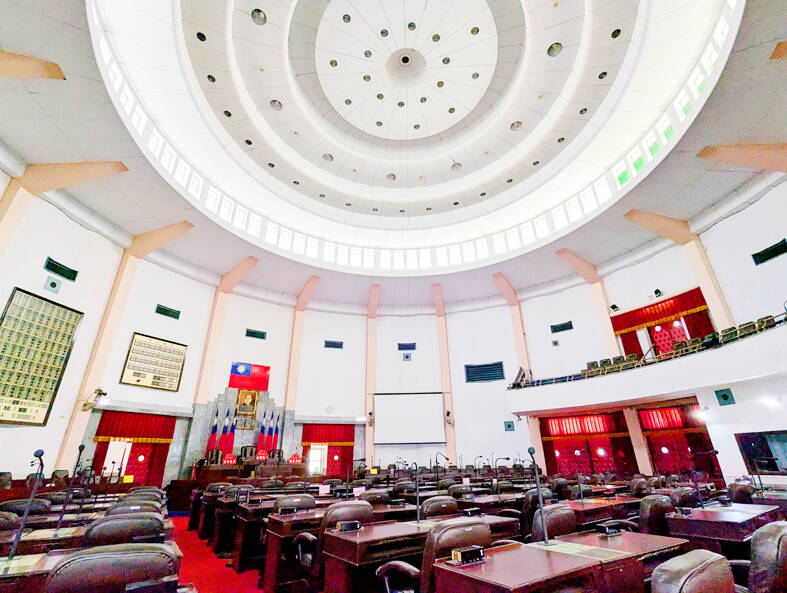The Assembly Affairs Museum reopened last month after more than three years of renovations, offering visitors a chance to explore Taiwan’s political development through legislature-themed exhibitions.
The facilities and exhibitions are “the only national-level museum in Taiwan with politics as the theme” and have undergone comprehensive upgrades since 2021, museum staff said.
The museum in Democratic Assembly Affairs Park in Taichung’s Wufeng District (霧峰) showcases the history of the Legislative Yuan from its founding in China in 1928 to its relocation to Taiwan in 1950 and beyond.

Photo: CNA
The first floor of the museum features three main exhibition areas on the themes of “the road to democracy,” “the evolution of the Legislative Yuan” and “the Legislative Yuan opens its doors.”
Visitors can see a replica of the Constitution of the Republic of China as well as an iron seal in the form of a Hsieh-chih, a mythical Chinese unicorn-like creature, which was previously used to stamp important documents.
On the second floor, additional exhibition spaces include “National Assembly,” “congressional diplomacy,” and “democracy garden” showcasing the evolution of the legislature.
Another highlight is a historically preserved “time capsule VIP room” that received Taiwanese and foreign dignitaries between 1983 and 2007 when the building served as a library for the now-abolished Taiwan Provincial Council.
The Assembly Affairs Museum is open from 9am to 12pm and 2pm to 5pm on Tuesdays to Fridays, and between 9am and 4pm on Saturdays and Sundays, the museum said.
The museum is closed on Mondays. Entry is free of charge.
All exhibits feature English and Chinese-language information, museum staff said.

A Taiwanese software developer has created a generative artificial intelligence (AI) model to help people use AI without exposing sensitive data, project head Huang Chung-hsiao (黃崇校) said yesterday. Huang, a 55-year-old coder leading a US-based team, said that concerns over data privacy and security in popular generative AIs such as ChatGPT and DeepSeek motivated him to develop a personal AI assistant named “Mei.” One of the biggest security flaws with cloud-based algorithms is that users are required to hand over personal information to access the service, giving developers the opportunity to mine user data, he said. For this reason, many government agencies and

The National Fire Agency on Thursday said a series of drills simulating a magnitude 8.5 earthquake would be held in September to enhance the government’s emergency response capabilities. Since earthquakes cannot be predicted, only by continuously promoting disaster prevention measures could Taiwan enhance its resilience to earthquakes, agency Director-General Hsiao Huan-chang (蕭煥章) said in a news release. The exercises would be held to mark annual National Disaster Prevention Day on Sept. 21, the aim of which is to test Taiwan’s preparedness and improve its earthquake resilience in case of a major temblor, Hsiao said. As part of those drills, an earthquake alert would

DEFENSE: The National Security Bureau promised to expand communication and intelligence cooperation with global partners and enhance its strategic analytical skills China has not only increased military exercises and “gray zone” tactics against Taiwan this year, but also continues to recruit military personnel for espionage, the National Security Bureau (NSB) said yesterday in a report to the Legislative Yuan. The bureau submitted the report ahead of NSB Director-General Tsai Ming-yen’s (蔡明彥) appearance before the Foreign and National Defense Committee today. Last year, the Chinese People’s Liberation Army (PLA) conducted “Joint Sword-2024A and B” military exercises targeting Taiwan and carried out 40 combat readiness patrols, the bureau said. In addition, Chinese military aircraft entered Taiwan’s airspace 3,070 times last year, up about

STRICTER ENFORCEMENT: Taipei authorities warned against drunk cycling after a sharp rise in riding under the influence, urging greater public awareness of its illegality Taipei authorities have issued a public warning urging people not to ride bicycles after consuming alcohol, following a sharp rise in riding under the influence (DUI) cases involving bicycles. Five hundred and seven people were charged with DUI last year while riding YouBikes, personal bicycles, or other self-propelled two-wheelers — a fourfold increase from the previous year, data released by the Taipei Police Department’s Traffic Division showed. Of these, 33 cases were considered severe enough to be prosecuted under “offenses against public safety,” the data showed. Under the Road Traffic Management and Penalty Act (道路交通管理處罰條例), bicycles — including YouBikes and other